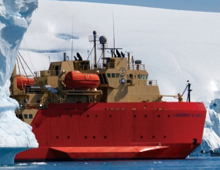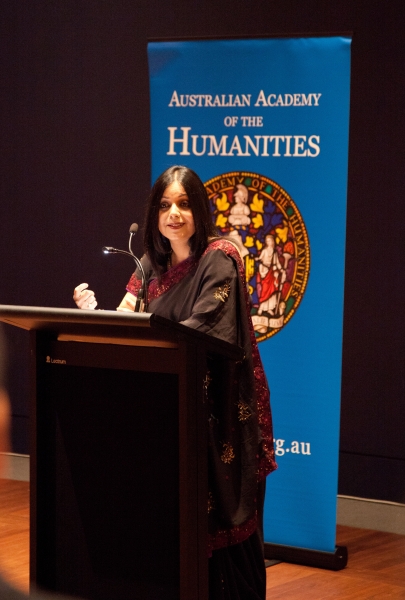The 2012 CHCI Annual Meeting. Anthropocene Humanities Report

How do we do Humanities in the era of the Anthropocene?
This was the challenge that the 2012 annual meeting of the Consortium of Humanities Centers and Institutes (CHCI) set itself when its members met at the Humanities Research Centre from 13-16 June. This was the first time in over a decade that the annual meeting of this global consortium was held in the southern hemisphere.
The Annual Meeting theme and title, 'Anthropocene Humanities', refers to a concept propounded by Nobel Prize-winning scientist Paul J. Crutzen in 2000 to emphasize the central role of humankind in transforming the planet's ecological and geological make up. In recent years, we have seen a groundswell of interest among humanities scholars in addressing the challenge of climate change and other environmental problems.
Luminaries from across the globe converged at ANU for one of the largest meetings of humanities leaders in this part of the world. They included Harriet Ritvo (MIT), James Chandler (UChicago), Srinivas Aravamudan (Duke), Ian Baucom (Duke), Michael Berube (President, MLA), Michael Steinberg (Brown), Tim Murray (Cornell), Kathleen Woodward (UWashington, Seattle, Member of MLA Executive), Alan Chan (Dean of Humanities, Nanyang, Singapore), Rosi Braidotti (Utrecht), Susan Manning (Edinburgh) and Robert Gibbs (UToronto).
The three plenaries by Elizabeth Povinelli (Columbia), Ross Garnaut (Melbourne), and Dipesh Chakrabarty (Chicago) addressed serious epistemological, socio-behavioural and policy challenges posed by climate change. Professor Garnaut's paper is available here.
Our Annual Meeting was designed to generate a critical conversation on this timely and important topic. The meeting forums included panels, plenaries, an art exhibition and a musical performance. The idea of Anthropocene itself was interrogated for its geological, historical and socio-cultural implications. Does it coincide with the first industrial revolution in eighteenth century Britain? How about the impact of the rise of agriculture on the planet? How do the spatio-temporal coordinates of capitalist globalization map on to the vast geological coordinates of the Anthropocene? Can one offer a staggered history of the Anthropocene for regions previously marked by indigenous ecologies? How do we theorise the human simultaneously as a source of historical freedom and a geological force? Is a policy on emissions trading and carbon capture really adequate to the task of humanly managing global climate change?
Panel speakers included Paul Holm (Trinity College, Dublin), Libby Robin (ANU), Karen Pinkus (Cornell University), Iain McCalman (University of Sydney), Alison Bashford (University of Sydney), and Peter Veth (UWA).
Art and performance
One of the highlights of the meeting was an art exhibition on ‘Antarctica’ curated by Caroline Turner in collaboration with the Drill Hall Gallery. Artists represented were Sidney Nolan, Bea Maddock, Anne Noble, Chris Drury, Jorg Schmeisser, Jans Sensbergs and Phillip Hughes. Antarctica symbolizes the last frontier of human habitation on this planet. The exhibition was opened by Barry Jones, former Minister responsible for Antarctica. See article here.
 A musical performance by ANU harpist, Alice Giles, Creative Arts Fellow on the 2010 Antarctica Expedition, provided an apt finale for the conference. Anthropocene Humanities may yet be just an imaginary that needs the non-referential language of music to keep its promise alive. You can see a recording of Alice's 2011 performance of Antarctica at ANU's 2011 Antarctica - Music, Sounds and Cultural Connections conference here.
A musical performance by ANU harpist, Alice Giles, Creative Arts Fellow on the 2010 Antarctica Expedition, provided an apt finale for the conference. Anthropocene Humanities may yet be just an imaginary that needs the non-referential language of music to keep its promise alive. You can see a recording of Alice's 2011 performance of Antarctica at ANU's 2011 Antarctica - Music, Sounds and Cultural Connections conference here.
Mellon Initiatives
Humanities Centers have been sites of innovation and experimentation in the new humanities for decades now. A major highlight of the CHCI meeting was a forum to discuss several Mellon funded initiatives in global humanities planned by the CHCI in the last two years.
These include projects on Environmental Humanities, Medical Humanities, Religion, Secularism and Political Belonging and a pilot on innovative graduate training. Each of these initiatives will be networked across at least three continents. Clusters of Centres from around the world will be major nodes for these initiatives over the next 3-4 years.
 ANU through the Humanities Research Centre’s director, Debjani Ganguly, is a member of the Committee that will oversee these projects.
ANU through the Humanities Research Centre’s director, Debjani Ganguly, is a member of the Committee that will oversee these projects.
The Chair of the Committee is James Chandler, Director of the Franke Humanities Institute at the University of Chicago. Other members include Michael Steinberg, Director of the Cogut Humanities Center (Brown), Ian Baucom, Director of the Franklin Humanities Institute (Duke) and Srinivas Aravamudan (President, CHCI).






